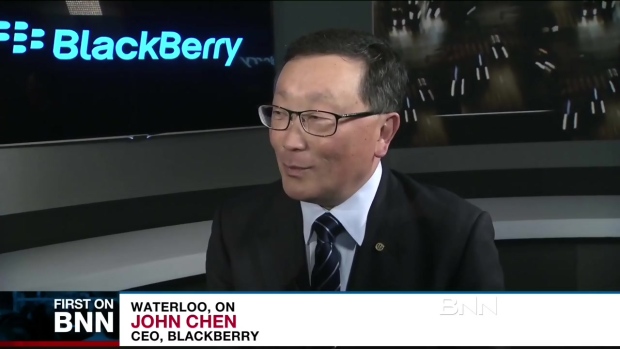Dec 20, 2016
BlackBerry’s CEO targets revenue growth next year amid turnaround

BlackBerry CEO John Chen sees light at the end of the tunnel.
Speaking to BNN on the heels of the company's latest earnings report - one that saw the company miss third-quarter sales expectations but raise its full-year profit forecast - Chen expressed his optimism for a turnaround next year.
“I hope sometime next year we will do that [post total revenue growth]. I think the software growth is now fast enough that we’re starting to cover the [system access fee] decline.”
The Waterloo, Ont.-based firm announced in September it would exit the hardware business in response to waning handset sales as competitors such as Samsung and Apple gained greater market share.
Since then, it has announced two deals for partners to design, manufacture and distribute phones that use BlackBerry's software. The agreements span nearly every country and another deal is in the works for India, Chen said.
BlackBerry receives "ongoing, high-margin royalty revenue" by licensing its software to these partners based on the number of units sold, Chen said.
The former pioneer of the smartphone industry is also trying to position itself in the burgeoning market of self-driving vehicles, and on Monday it formally opened a research centre for autonomous cars in Ottawa.
BlackBerry also announced a new platform, BlackBerry Secure, that integrates all of the company's recent acquisitions and intends to help companies reliably manage their current and future connectivity needs, like keeping tabs on all their devices.
The transformation has yet to eliminate BlackBerry's losses before adjustments.
BlackBerry, which reports in U.S. currency, says its latest quarterly loss amounted to 22 cents per basic share under generally accepted accounting principles.
That's its smallest GAAP loss of the current financial year, but several million more than the same time last year when it reported an $89-million loss, worth 17 cents per share.
After adjustments that eliminate some expenses and adds some deferred software revenue, BlackBerry says it earned two cents per share or $9 million on a non-GAAP basis for the quarter ended Nov. 30.
Revenue was $289 million under generally accepted accounting rules, down from $548 million a year earlier. With adjustments, revenue for the quarter was $301 million -- including $12 million of deferred revenue from software.
The majority of adjusted revenue -- about 55 per cent -- came from software and services, which brought in $164 million, an increase of $8 million from the previous quarter and $10 million from the same quarter last year.
But it wasn't enough to offset the drop in revenue from mobility solutions and service access fees.
Mobility solutions, including BlackBerry's dwindling handset business, generated 23 per cent of revenue or $70 million. That's down from $105 million in the previous quarter and from $214 million at the same time last year, under the former hardware category.
The remaining 22 per cent of revenue came from service access fees, which brought in $67 million down from $91 million last quarter and $173 million at the same time last year.
But Chen remains confident the company's new focus will translate into a financial turnaround, anticipating 30 per cent growth in software and services for BlackBerry's full fiscal year. He expects that will make up for the estimated decline in the other two categories next quarter.
BlackBerry raised its adjusted earnings per share expectations for the full year and anticipates profitability by that measure. Before, it expected anywhere from break even to a five cent loss.
"This is of course a very significant improvement from where we started the year," Chen said.







